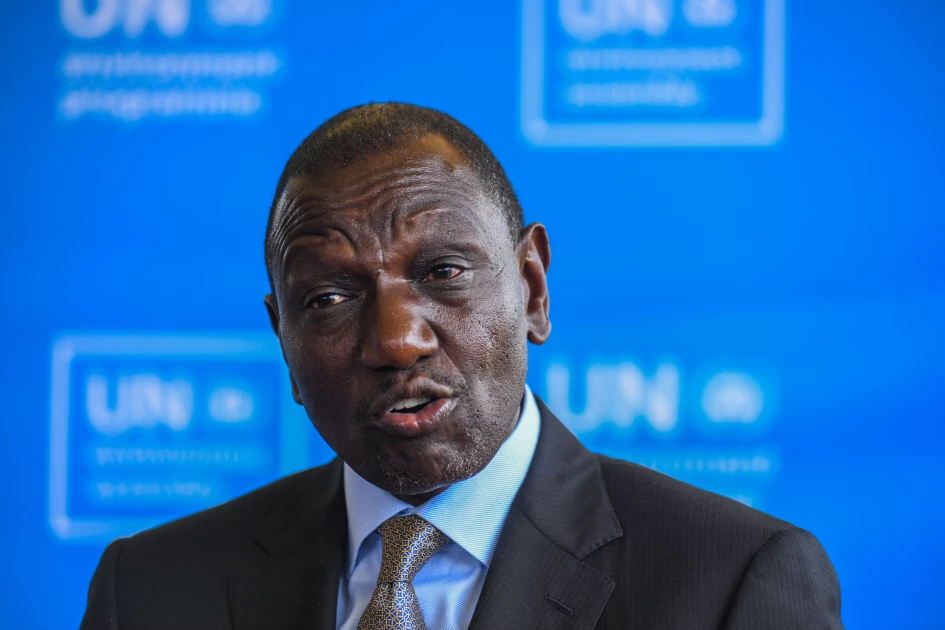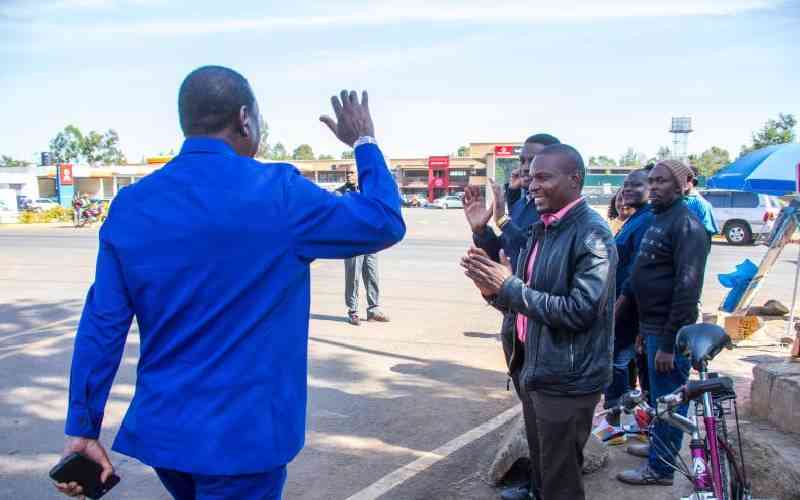ENS - News - Africa Business in Brief
PRINT | SUBSCRIBE | UNSUBSCRIBE | TEXT ONLY
issue 582 | 23 Feb 2025
The United Nations Economic Commission for Africa (ECA) and the African Continental Free Trade Area (AfCFTA) Secretariat have signed a memorandum of understanding (MoU) to enhance cooperation in supporting the effective implementation of the AfCFTA. The signing ceremony took place during the Africa Business Forum 2025 in Addis Ababa, Ethiopia. This landmark agreement sets the stage for closer collaboration between the two institutions to advance trade integration, industrialisation, and private sector development across Africa. The MoU establishes a framework for ECA and the AfCFTA Secretariat to work together in key areas, including market access and trade facilitation – supporting the removal of tariff and non-tariff barriers to trade; industrial and regional value chains – promoting industrialisation and deeper economic linkages across African economies; training and capacity building – strengthening institutional and technical capacities to implement AfCFTA policies; customs and transit systems – enhancing trade logistics and cross-border efficiency; and private sector development – encouraging business engagement in intra-African trade.
Source: ECA
At the end of the sixth meeting of the Coordination and Collaboration Platform of Regional Economic Communities (RECs) from all over Africa which was held on 14 February 2025 in Addis Ababa, Ethiopia, Dr Omar Alieu Touray, President of the Economic Community of West African States (ECOWAS) Commission officially handed over to Workneh Gebeheyu, Executive Secretary of the Intergovernmental Authority on Development (IGAD). The sixth meeting of the platform was attended by the presidents and chief executives of all the RECs, including the ECOWAS, the Arab Maghreb Union, the Common Market for Eastern and Southern Africa, the Community of Sahel-Saharan States, the Economic Community of Central African States, the East African Community, IGAD and the Southern African Development Community. Several points were discussed during this session organised by the ECOWAS External Relations Directorate, including the status of implementation of the recommendations from the RECs meeting held on 20 July 2024 in Accra, Ghana, the presentation, discussions and adoption of the document on the position of the RECs in their cooperation relationship with the African Union, the issue of resource mobilisation and the handover to the new president, coordinator of the inter-RECs platform.
Source: ECOWAS
Angola’s Minister of Mineral Resources, Oil and Gas Diamantino Azevedo hosted Ambassador of Türkiye to Angola Ufuk Akici to discuss preparations for the upcoming third session of the Joint Economic Commission of Angola-Türkiye. The session will focus on key issues aimed at enhancing collaboration in sectors such as mining and petroleum. Following the meeting, Ambassador Akici highlighted the upcoming Joint Economic Commission of Angola-Türkiye as a crucial step toward advancing negotiations between the two countries, with expectations for strengthening bilateral ties and cooperation.
Source: Energy Capital & Power
Rice production in Benin has almost doubled in the space of three years, heading north from 406 000 tonnes in 2020 to nearly 712 000 tonnes in 2023 and thereby exceeding the initial target of 700 000 tonnes. Maize production rose to 1.7 million tonnes in 2023, compared with 1.5 million tonnes three years earlier. At the same time, the share of Benin’s cashew nut production that is processed inside the country more than doubled from 19% to 40.26%, thanks to processing operations at the Glo-Djigbé industrial zone. The Glo-Djigbé zone is supported by the African Development Bank (AfDB) Group to support economic reforms in Benin. The impressive output results for rice and maize were also achieved thanks to the AfDB’s support. Agricultural producers in Benin have been given a new lease of life by two AfDB projects contained within its 2022-2026 country strategy for Benin. These are the Project to Support Agricultural Infrastructure in the Ouémé Valley and the Project to Support Food Production and Strengthen Resilience in the Departments of Alibori, Borgou and Collines. The impressive results figured in the Benin - Combined Country Strategy Paper 2022-2026 Midterm Review published by the AfDB on 11 February 2025.
Source: AfDB
The Government of Botswana has lifted its eyes to the energy sector as a possible revenue earner as problems in the diamond sector persist. In his first official address recently, Vice President and Finance Minister, Ndaba Gaolathe, discussed the previous administration’s Integrated Resource Plan, which targeted 30% renewable energy by 2030 and 50% by 2036. He confidently announced then that the new government intends to surpass this target in a significantly shorter time frame. “As the incoming government, we are setting our sights even higher,” Gaolathe stated. “I [will not] specify percentages, but we are aiming beyond previous ambitions, because our people envision more,” he noted. He highlighted Botswana’s immense solar potential, noting that the country ranks third globally for solar radiation exposure, with approximately 3 200 hours of sunshine annually. “With this resource, there is no reason Botswana cannot become a hub for solar-generated power,” Gaolathe asserted. “Everyone knows that Botswana has committed to reducing its carbon footprint by 15% by 2030. Yet, we aspire to even more. “That said, as a small, developing nation, we need some flexibility to build our economy to a stage where we can uphold ambitious carbon commitments,” he added.
Source: Mmegi
The Minister of Finance, Ndaba Gaolathe, has announced plans to create a “fully-fledged” Sovereign Wealth Fund, moving in line with recommendations by the International Monetary Fund and the Bank of Botswana which have called for the establishment of a strong generational fiscal reserve. While the country currently has the Pula Fund acting as a fiscal buffer and a store of reserves for future generations, experts have said the fund has structural weaknesses, which include the lack of commitments around deposits and poor control of frequent withdrawals. Delivering his inaugural budget speech, Gaolathe said government was committed to ensuring long-term macroeconomic stability and fostering intergenerational equity by preserving sufficient assets and wealth for future generations. “To achieve this, we will re-design our macroeconomic policy framework to safeguard the needs of future generations by ensuring that they benefit from our natural resource wealth,” he said. “Efforts are underway to create a new fully-fledged Sovereign Wealth Fund. “This fund will invest in sustainable domestic and foreign assets across various industries, thereby transforming resource wealth into financial wealth.” Gaolathe, who is also the Vice President, explained that the fund will help to cushion against unforeseen disasters whilst creating wealth for current and future generations.
Source: Mmegi
The World Bank has approved USD170-million from the International Development Association to help Chad improve connectivity, logistics, and value chains with subregional commercial potential in the Lake Chad region. The Chad Connectivity and Integration Project aims to pave 55 km of the Liwa-Rig Rig section and 12 km of access roads connecting the city of Bol on the Trans-Saharan Highway. It will also improve 50 km of rural roads, enhancing market access for rural areas. The project includes building solar-powered trade and agricultural logistics facilities, like warehouses and markets, to support women in Bol, Bagasola, and other regions. "The project aims to improve the efficiency and safety of transport along the Trans-Saharan Highway and the navigability of Lake Chad. This will help stabilise the region, promote economic opportunities, and connect isolated populations to agricultural areas, markets, schools, and health services," said Clara de Sousa, World Bank Country Director for Chad. The Lake Chad region suffers from low social and economic development due to large infrastructure gaps, low access to basic services, and livelihoods affected by climate change and conflict.
Source: World Bank
The World Bank and the Government of Eswatini launched a new review highlighting ways to make fiscal policy in Eswatini more efficient and effective. The Eswatini Public Finance Review (PFR): Leveraging Fiscal Adjustment for Better Development Outcomes, is the first review for Eswatini since 1996. The review aims to support the country in enhancing the efficiency and effectiveness of public spending and revenue mobilisation to drive sustainable and inclusive economic growth. It provides a comprehensive analysis of Eswatini’s fiscal policy and its role in addressing constraints to economic growth and livelihoods. The review acknowledges Eswatini’s strong post-pandemic recovery, which averaged 5.3% growth from 2021 to 2023, while underscoring the urgent need for reforms to achieve broad-based economic progress. “The government has made significant progress since 2019 in reducing the fiscal deficit and implementing fiscal adjustment measures. Notwithstanding, stepped-up efforts are needed to implement some of the critical reforms highlighted in the [PFR],” says Eswatini’s Minister of Finance, Neal Rijkenberg.
Source: World Bank
The Gambia Circular Economy Diagnostic aims to identify circular economy opportunities within the tourism sector. Despite its significant potential, The Gambia faces substantial challenges in resource efficiency and environmental sustainability, particularly in areas like plastic waste management and recycling. Although the tourism sector has attracted over USD45-million in foreign investments since 2015, only a small fraction of these funds has been directed toward managing tourism's environmental impact. This study finds municipal solid waste generation has risen from 0.4 million tons in 2011 to 0.6 million tons in 2020, with organic waste making up 51% of the total waste. Waste management in the country is fragmented, characterised by limited formal collection services. The energy sector is heavily dependent on non-renewable sources, primarily oil, with renewable energy contributing only 43% of the energy supply. While the Gambia River offers ample surface water, the country’s potable water supply is primarily drawn from groundwater, which is at risk of contamination and over-extraction. This report provides strategies to improve resource efficiency and promote circularity, tailored to The Gambia's unique geographic and economic landscape. The study also assessed the size of the potential market for sustainability initiatives in the tourism sector. Findings reveal a strong willingness among tourism businesses to adopt sustainable practices, though challenges such as financial constraints and lack of infrastructure remain.
Source: World Bank
An International Monetary Fund (IMF) staff team led by Stéphane Roudet visited Ghana from 10 – 14 February as part of their regular engagement with the Ghanaian authorities and other stakeholders. At the conclusion of the visit, Mr Roudet issued the following statement, in part: “The mission team engaged the Ghanaian authorities on recent macroeconomic developments. It also started discussions on the policies that will underpin the 2025 budget. This dialogue is set to continue over the coming weeks. “We also took stock of the authorities’ progress in meeting key commitments under the IMF-supported programme. These will be formally assessed in the context of the fourth review of the Extended Credit Facility arrangement, which is expected to be undertaken in April 2025. “IMF staff held meetings with President Mahama, Finance Minister Forson, and Bank of Ghana Acting Governor Johnson Pandit Asiama, and their teams, as well as representatives from various government agencies, and other key stakeholders. Staff would like to express their gratitude to the Ghanaian authorities and other stakeholders for their constructive engagement and support during this mission.”
Source: IMF
Kenya is now the number three exporting country in the global air transported flower trade, the International Air Transport Association – the global representative body for the airline industry – has reported. And Ethiopia is now in fourth place. This was against the background of a dramatic increase in the global flower trade over the period from 2003 to 2024, the association highlighted. In 2003, the global air-transported flower trade was worth USD852-million. By 2024, it had increased by four times, to USD3.7-billion. In 2003, the main exporting country was Colombia, with a share of 50.2%, followed by Ecuador at 16.2% and the Netherlands at 8.9%. In fourth place was Kenya, at 8.6%. The rest of the world accounted for 16%. Last year, South America retained its dominant position in the trade, with Colombia still in first place, but its share had reduced to 42.3%. Ecuador remained second, but its share had increased to 26.1%. Then came Kenya, with a share that had nearly doubled, to 16.1%, followed by Ethiopia, with a share of 5.5%. The rest of the world accounted for 10.3%.
Source: Engineering News
Malawi, Mozambique and Zambia are working to integrate their customs systems to enhance trade, with a two-week workshop underway to facilitate the process, local media reported. The workshop aims to enable customs data sharing to help streamline the clearance of goods crossing borders along the Nacala Development Corridor, a key trade route involving rail and road networks for landlocked Malawi and Zambia to access the Indian Ocean port of Nacala in Mozambique, the report said. The arrangement is part of the Southern Africa Trade and Connectivity Project supported by the World Bank. As part of the initiative, several One Stop Border Posts have been set up between the neighbouring countries. Cornelius Kakweza, Commissioner of Customs and Excise of the Malawi Revenue Authority, told local media that the initiative has the potential to boost trade among the three countries as it will be cheaper and faster to clear goods at borders. "By streamlining procedures, traders will have clearer expectations regarding costs and requirements at border crossings," Kakweza said.
Source: Xinhua
Namibia’s exports to the European Union (EU) have more than doubled in the past two decades, rising from approximately NAD9-billion in 2004 to over NAD20-billion in 2023, according to the EU-Namibia Trade Statistics bulletin. The report underscores the EU’s role as a key trading partner for Namibia, with a broad range of goods forming the bulk of exports. “The EU and its 27 member states trade as a single bloc. For two decades, it has been one of Namibia’s largest trade partners. Crucially, Namibia enjoys a positive trade surplus with the EU driving sustainable growth. This growing partnership strengthens our ties and creates jobs and opportunities for Namibians. It is truly a partnership that works,” says EU Ambassador to Namibia Ana-Beatriz Martins. According to the author of the trade statistics report, Robin Sherbourne, Namibia exports nine main product groups to the EU, with some commodities destined for specific member states while others are distributed across multiple markets. In 2023, frozen hake fillets, fresh hake and other fish products were mainly exported to Spain, but also reached the Netherlands, France, Italy, Germany and other EU countries. Refined copper was primarily exported to Belgium and the Netherlands, while rough diamonds were mainly shipped to Belgium.
Source: The Namibian
The Bank of Namibia says the country faces a projected decline in Southern African Customs Union (SACU) revenue from NAD28-billion in 2024 to NAD21-billion in 2025. Head of investments at Simonis Storm Max Rix says the main contributors to the decline are global economic factors and shifts in SACU’s revenue-sharing formula. “The projected decline is a stark reminder of Namibia’s vulnerability to external economic forces and internal structural challenges. This decline is driven primarily by the global downturn in commodity prices, particularly in the sectors that underpin SACU’s revenue calculations. Namibian exports, notably in mining and energy, have suffered from this downturn, reducing the overall revenue pool available for distribution among SACU members,” he says. He also notes that adjustments to the SACU revenue-sharing formula have worsened the situation. “Complicating matters further, adjustments in the SACU revenue-sharing formula have shifted the fiscal landscape in ways that magnify the impact on Namibia. This is not a marginal adjustment; it represents a substantial contraction that exposes the inherent risks of overreliance on external revenue streams,” Rix says. The decline in SACU revenue is expected to have an immediate impact on Namibia’s national budget.
Source: The Namibian
The Namibian Stock Exchange has announced its rebranding to the Namibia Securities Exchange (NSX), effective as of November 2024. This change reflects the exchange’s commitment to enhancing and diversifying the capital market and driving future economic growth, Tiaan Bazuin NSX Chief Executive said recently. “The rebranding also marks a significant milestone in the goal towards demutualisation, though the process itself is not yet complete as there are still several key steps to be taken before the full transition is made,” he added. In the meantime, the NSX has requested that all stakeholders update their records to reflect the name change, including any documents, contracts, or other materials that reference the exchange. “We greatly appreciate your continued trust and support during this transition,” he concluded.
Source: Namibia Economist
The construction of Tanzania's first-ever fishing harbour by China Harbor Engineering Company Ltd, a leading Chinese construction company, has reached 79%, a senior Tanzanian official said recently. Gerson Msigwa, Chief Government Spokesperson, said the construction of the fishing harbour in Kilwa Masoko in the Lindi Region was expected to transform the fishing industry by bolstering deep-sea fishing and improving the livelihoods of fishing communities. The fishing harbour project included the construction of berths, which were 98% complete, as well as an administration building and a cold storage facility for preserving fish, said Msigwa, who is also the Permanent Secretary in the Ministry of Information, Culture, Arts and Sports, during a press conference. "The completion of this fishing harbour will stimulate investments in fish processing factories and the development of infrastructure for fisheries products storage," he said. The project has helped more than 400 local people get jobs, according to the Tanzania Ports Authority.
Source: Xinhua
The Bank of Tanzania (BoT), in partnership with the Ministry of Finance, is working on new regulations to enforce a ban on using foreign currencies for domestic transactions. This follows amendments made to the Bank of Tanzania Act under Section 26(2), which now prohibits the use of foreign currency for transactions within the country. The law aims to protect Tanzania’s monetary policy by ensuring that the Tanzanian shilling remains the primary currency in use. Manager of International Economics and the Real Sector at BoT, Villela Waane, said that once the drafting process is completed, the regulations will be gazetted and made available to the public. She said that the use of foreign currency undermines the effectiveness of Tanzania's monetary policy and contributes to inflationary pressures. “Using foreign currencies domestically limits the supply of foreign currency needed for importing essential goods,” she said. The BoT has instructed commercial banks to cease facilitating transactions involving foreign currencies, including payments for taxes, fees, goods, and services. “The aim is to strengthen the Tanzanian shilling's value and ensure foreign currencies are reserved solely for essential imports,” she added.
Source: The Citizen
Forests, often called the lungs of our planet, play a critical role in sustaining biodiversity, regulating climate and supporting livelihoods. Yet, deforestation remains one of the most pressing environmental challenges of our time. As global markets increasingly prioritise sustainability, measures to combat deforestation are reshaping international trade policies and supply chains. A European regulation aimed at preventing commodities linked to deforestation from entering the market will take effect in 2025. Ugandan farmers, particularly coffee and cocoa exporters, will not be immune to its impact.
Source: ENS
Zambia has suspended a 15% export tax on precious stones and metals in a bid to enhance competitiveness on the global market and draw investment, the finance ministry has said. The southern African country, the world's second largest emerald producer after Colombia, reintroduced the tax in January 2025 after it was suspended in 2019. "Zambian precious stones and metals will now be priced more competitively on the global market, thereby attracting greater interest from international buyers and leading to higher sales volumes," the ministry said in a statement. In January, Gemfields which operates the Kagem emerald mine, one of the biggest in the world, warned that the export tax would hurt Zambia's gemstone sector and asked the government to remove it. Recently Gemfields CEO Sean Gilbertson said the Zambian Government's "decisive action" on the export tax would set the industry "back on track". Kagem, which accounts for about 25% supply of global rough emeralds, produced about 10 million carats of emeralds and about 30 million carats of beryl in 2024.
Source: Reuters











